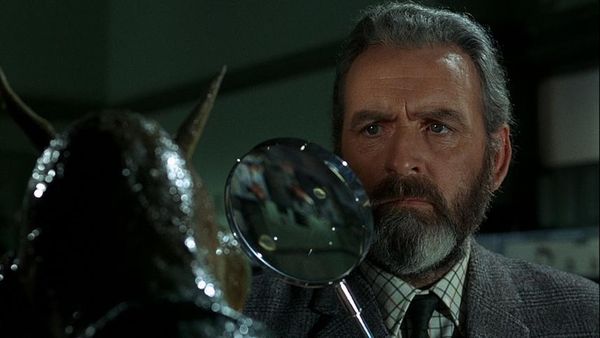Eye For Film >> Movies >> Quatermass And The Pit (1967) Film Review

A Hammer Horror film about an alien invasion may sound old fashioned today, but Quatermass And The Pit is something else. A tale whose central premise is solidified by reference to myth, it has itself developed a solidity that stands the test of time - it is an old tale, with all the weight that implies, rather than a dated one. Its several retellings have contributed to the curious sense that one is observing differing accounts of real events, adding to its power. Though this isn't the strongest version, it is nevertheless compulsive viewing.
It's often easier to relate to a film filled with familiar things, and British viewers who find themselves left cold by the dialogue of Hollywood will feel right at home here. The London setting has that newsreel quality, that roughness, that added an element of realism to much of Hammer's early output, a far cry from their later glossy fantasies. As we watch people going about their daily business, walking by Hobbs' End tube station, we expect to encounter conversations about football and complaints about the weather rather than anything otherwordly. And the first strange things we do encounter - the discovery of ancient bones where a tunnel is being excavated - are so mundanely handled that there seems no reason to be alarmed.

Quatermass And The Pit is a tale filled with creeping fear. It takes a while to build, but that makes it all the harder to guard against. The science fiction plot is subtly developed and not - if you're a newcomer - what you might expect, but it's the underlying themes that have the real power. Carrying it along are a powerful cast, most notably Andrew Keir as the eponymous professor, a reassuring hero on the surface but with just a hint of something darker. Barbara Shelley gets little to do as his assistant but still comes across as a forceful personality, and refreshingly competent. The supporting performances are naturalistic enough that one doesn't immediately notice how many are in stock Hammer roles.
Although this film is scripted by Nigel Kneale, who also wrote the book and TV series, it takes a different direction, bringing out different things in the material, and this is perhaps where it is weaker - there's a sense that Kneale is looking for a Deus ex machina to explain what he dislikes in humanity, rather than drawing parallels with something innate in humanity itself. This externalises the struggle between good and evil, at least as we move away from the character of Quatermass himself. It's a sort of excuse-making that's disappointing in a man whose professed dislike of science fiction might have made him more wary of its familiar traps. But this is redeemed, to an extent, by an affectingly downbeat ending. Even if its origins are placed elsewhere, we are left wondering if there could ever be any way to put the genie back in the bottle.
With London riots still fresh in the memory and some of the film's other musings now much more relevant than they were when it was made (like the suggestion that a species may be dying out on its homeworld due to climate change; or the mind-imaging device, which we've just invented), Quatermass And The Pit doesn't feel like an old film at all. If such a discovery were to be made in a London tube station today, would things really be much different? The underlying horror seems unlikely to leave us.
Reviewed on: 01 Oct 2011

















